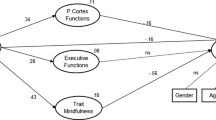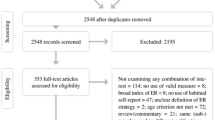Abstract
Cognitive distortions, defined as erroneous information-processing, are involved in the emergence and maintenance of various mental and emotional disorders, including anxiety and depression. On the other hand, several studies highlight the existence of links between these states and the dimensions of impulsivity. We therefore studied the links between cognitive distortions, anxiety and depressive symptomatology, and impulsivity. Two hundred and forty adults (aged 18–60 years, 101 men, 139 women) completed the French version of the Impulsive Behavior Scale, the Cognitive Distortions Scale for Adults and the Hospital Anxiety and Depression Scale. The results obtained highlight the existence of a cognitive distortion specific profile regarding the urgency dimension. Negative maximization, disqualification of the positive, negative-focused dichotomous reasoning, positive arbitrary focus, and neutral omission in favour of the negative are thus the distortions most associated with the level of urgency of subjects. The results also show, a moderating effect of the level of urgency on the interaction between anxiety and negative focused dichotomous reasoning. As well as on the interaction between depression and positive minimization, and between depression and positive maximization. The discussion of the results focuses on the interpretation of the data regarding the anxiety-depressive states in general population.

Similar content being viewed by others
Availability of data and materials
The material used consists of statistically validated tools published in referenced journals, which are therefore available. The data collected for this study will be made available if necessary, upon request to the corresponding author.
References
Bechara A, Van der Linden M (2005) Decision-making and impulse control after frontal love injuries. Curr Opin Neurol 18(6):734–739. https://doi.org/10.1097/01.wco.0000194141.56429.3c
Beck AT (1964) Thinking and depression: II. Theory and therapy. Arch General Psychiatry 10(6):561–571
Beck AT (1967) Depression: clinical, experimental, and theoretical aspects. Harper and Row
Beck AT (1976) Cognitive therapy and the emotional disorders. New American Library
Beck JS (1995) Cognitive therapy: basics and beyond. Guilford
Billieux J (2012) Impuslivité et psychopathologie : Une approche transdiagnostique. Rev. Francophone De Clin. Comportementale Et Cognit. 17:42–65
Billieux J, Rochat L, Van der Linden M (2008) Une approche cognitive, affective et motivationnelle de l’impulsivité. In: Van der Linden M, Ceschi G (eds) Traité de psychopathologie cognitive, Tome I. Solal, pp 137–152
Billieux J, Rochat L, Van der Linden M (2014) L’Impulsivité : ses facettes, son évaluation et son expression clinique. Mardaga
Blackburn IM, Cottraux J (2008) Psychothérapie cognitive de la dépression, 3e édition. Elsevier Masson
Blicher A, Reinholdt-Dunne ML, Hvenegaard M, Winding C, Petersen A, Vangkilde S (2020) Engagement and disengagement components of attentional bias to emotional stimuli in anxiety and depression. J Exp Psychopathol. https://doi.org/10.1177/2043808720943753
Bongers IL, Koot HM, Van der Ende J, Verhulst FC (2003) The normative development of child and adolescent problem behavior. J Abnorm Psychol 112(2):179–192. https://doi.org/10.1037/0021-843X.112.2.179
Brooks AW (2014) Get excited: reappraising pre-performance anxiety as excitement. J Exp Psychol Gen 143(3):1144–1158. https://doi.org/10.1037/a0035325
Chan Chee C, Badjadj L (2018) Prise en charge des patients avec troubles anxieux entre 2010 et 2014 dans les établissements ayant une autorisation en psychiatrie en France métropolitaine : analyse des données du RIM-P. Bull Epidémiol Hebdomadaire 32–33:653–661
Cyders MA, Smith GT (2008) Emotion-based dispositions to rash action: positive and negative urgency. Psychol Bull 134(6):807–828. https://doi.org/10.1037/a0013341
Drapeau M, Perry JC, Dunkley D (2005) The cognitive errors rating system. McGill University
Ellis A (1958) Rational psychotherapy. J Gen Psychol 13(1):344–350. https://doi.org/10.1080/00221309.1958.9710170
Ellis A (1962) Reason and emotion in psychotherapy. Lyle Stuart
Enticott PG, Ogloff JRP, Bradshaw JL (2006) Associations between laboratory measures of executive inhibitory control and self-reported impulsivity. Personality Individ Differ 41(2):285–294. https://doi.org/10.1016/j.paid.2006.01.011
Faul F, Erdfelder E, Lang A-G, Buchner A (2007) G*Power 3: a flexible statistical power analysis program for the social, behavioral, and biomedical sciences. Behav Res Methods 39(2):175–191. https://doi.org/10.3758/bf03193146
Franceschi P (2007) Compléments pour une théorie des distorsions cognitives. J De Thérapie Comportementale Et Cognit 17(2):84–88. https://doi.org/10.1016/S1155-1704(07)89710-2
Gay P, Rochat L, Billieux J, d’Acremont M, Van der Linden M (2008) Heterogeneous inhibition processes involved in different facets of self-reported impulsivity: evidence from a community sample. Acta Physiol (oxford) 129(3):332–339. https://doi.org/10.1016/j.actpsy.2008.08.010
Gay P, Schmidt RE, Van der Linden M (2011) Impulsivity and intrusive thoughts: related manifestations of self-control difficulties? Cognit Ther Res 35(4):293–303. https://doi.org/10.1007/s10608-010-9317-z
Gino F, Brooks AW, Schweitzer ME (2012) Anxiety, advice, and the ability to discern feeling anxious motivates individuals to seek and use advice. J Pers Soc Psychol 102(3):497–512. https://doi.org/10.1037/a0026413
Gotlib IH, Krasnoperova E, Yue DN, Joormann J (2004) Attentional biases for negative interpersonal stimuli in clinical depression. J Abnorm Psychol 113(1):121–135. https://doi.org/10.1037/0021-843X.113.1.121
Grahek I, Everaert J, Krebs RM, Koster EHW (2018) Cognitive control in depression: toward clinical models informed by cognitive neuroscience. Clin Psychol Sci 6(4):464–480. https://doi.org/10.1177/2167702618758969
Jacobson NC, Newman MG (2014) Avoidance mediates the relationship between anxiety and depression over a decade later. J Anxiety Disord 28(5):437–445. https://doi.org/10.1016/j.janxdis.2014.03.007
Kendall PC (1991) Guide theory for therapy with children and adolescents. In: Child and adolescent therapy: cognitive-behavior procedures (pp 3–24). Guilford
Kramer U, Drapeau M (2011) Validation study of the French version of the observer-rater scales measuring co** and cognitive errors (CE-CAP) on a non-clinical population. Ann Med Psychol 169(8):523–527. https://doi.org/10.1016/j.amp.2009.07.017
Kuru E, Safak Y, Özdemir I, Tulaci RG, Özdel K, Özkula NG, Örsel S (2018) Cognitive distortions in patients with social anxiety disorder: comparison of a clinical group and healthy controls. Eur J Psychiatry 32(2):97–104. https://doi.org/10.1016/j.ejpsy.2017.08.004
LeMoult J, Gotlib IH (2019) Depression: a cognitive perspective. Clin Psychol Rev 69:51–66. https://doi.org/10.1016/j.cpr.2018.06.008
Léon C, Chan Chee C, du Roscoät E et al (2018) La dépression en France chez les 18–75 ans : Résultats du Baromètre santé 2017. Bull Epidémiol Hebdomadaire 32–33:637–644
Miller J, Flory K, Lynam D, Leukefeld C (2003) A test of the four-factor model of impulsivity-related traits. Personality Individ Differ 34(8):1403–1418. https://doi.org/10.1016/S0191-8869(02)00122-8
Moustafa AA, Tindle R, Frydecka D, Misiak B (2017) Impulsivity and its relationship with anxiety, depression and stress. Compr Psychiatry 74:173–179. https://doi.org/10.1016/j.comppsych.2017.01.013
Pennequin V, Combalbert N (2017) L’influence des biais cognitifs sur l’anxiété chez des adultes non cliniques. Ann Med Psychol 175(2):103–107. https://doi.org/10.1016/j.amp.2015.07.040
Pothier B, Dobson KS, Drapeau M (2012) Investigating the relationship between depression severity and cognitive rigidity through the use of cognitive errors. Arch Psychiatry Psychother 14(2):35–40
Robert A, Combalbert N, Pennequin V (2018) Etude des profils de distorsions cognitives en fonction des états anxieux et dépressifs chez des adultes tout-venants. Ann Med Psychol 176(3):225–230. https://doi.org/10.1016/j.amp.2017.06.005
Robert A, Combalbert N, Pennequin V, Deperrois R, Ouhmad N (2023) Development of the cognitive distortion scale for adults (EDC-A): Study of psychometric properties in the general population and association with anxiety and depression. Psychol Fr 68(2):169–189. https://doi.org/10.1016/j.psfr.2021.04.003
Sala G, Haag C (2016) Comment vaincre l’anxiété en situation extrême ? Les secrets du GIGN, unité d’élite de la gendarmerie nationale. Rev Fr Gest 257(4):129–147. https://doi.org/10.3166/rfg.2016.00039
Smith GT, Guller L, Zapolski TG (2013) A comparison of two models of urgency: urgency predicts both rash action and depression in youth. Clin Psychol Sci 1(3):266–275. https://doi.org/10.1177/2167702612470647
Stewart S, Kennard B, Lee P, Hughes C, Mayes T, Emslie G et al (2004) A cross-cultural investigation of cognitions and depressive symptoms in adolescents. J Abnormal Psychol 113(2):248–257. https://doi.org/10.1037/0021-843X.113.2.248
Van der Linden M, d’Acremont M, Zermatten A, Jermann F, Laroi F, Willems S, Juillerat A-C, Bechara A (2006) A French adaptation of the UPPS Impulsive Behaviour Scale: confirmatory factor analysis in a sample of undergraduate students. Eur J Psychol Assess 22(1):38–42. https://doi.org/10.1027/1015-5759.22.1.38
Whiteside SP, Lynam DR (2001) The five-factor model and impulsivity: using a structural model of personality to understand impulsivity. Personal Individ Differ 30(4):669–689. https://doi.org/10.1016/S0191-8869(00)00064-7
Zigmond AS, Snaith RP (1983) The hospital anxiety and depression scale. Acta Psychiatr Scand 67(6):361–370. https://doi.org/10.1111/j.1600-0447.1983.tb09716.x
Funding
The authors did not receive support from any organization for the submitted work.
Author information
Authors and Affiliations
Corresponding author
Ethics declarations
Conflict of interest
The authors report no conflicts of interest.
Ethics approval
This study was approved by the local Research Ethics Committee (no. CER 2018-03-01).
Consent to participate
All participants in this study completed an informed consent form.
Additional information
Publisher's Note
Springer Nature remains neutral with regard to jurisdictional claims in published maps and institutional affiliations.
Editor: Jochen Kaiser (Goethe University of Frankfurt); Reviewers: two researchers who prefer to remain anonymous.
Rights and permissions
Springer Nature or its licensor (e.g. a society or other partner) holds exclusive rights to this article under a publishing agreement with the author(s) or other rightsholder(s); author self-archiving of the accepted manuscript version of this article is solely governed by the terms of such publishing agreement and applicable law.
About this article
Cite this article
Deperrois, R., Ouhmad, N. & Combalbert, N. Impulsivity, emotional disorders and cognitive distortions in the general population: highlighting general interaction profiles. Cogn Process (2024). https://doi.org/10.1007/s10339-024-01194-0
Received:
Accepted:
Published:
DOI: https://doi.org/10.1007/s10339-024-01194-0




